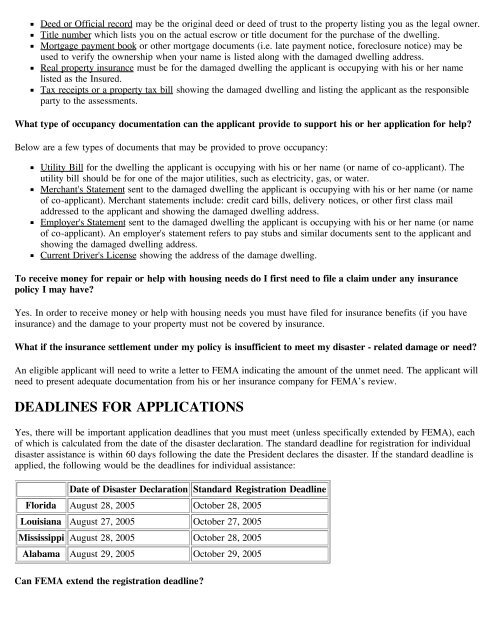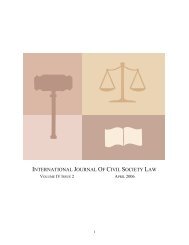Hurricane Katrina: Legal Issues - Columbus School of Law
Hurricane Katrina: Legal Issues - Columbus School of Law
Hurricane Katrina: Legal Issues - Columbus School of Law
Create successful ePaper yourself
Turn your PDF publications into a flip-book with our unique Google optimized e-Paper software.
Deed or Official record may be the original deed or deed <strong>of</strong> trust to the property listing you as the legal owner.<br />
Title number which lists you on the actual escrow or title document for the purchase <strong>of</strong> the dwelling.<br />
Mortgage payment book or other mortgage documents (i.e. late payment notice, foreclosure notice) may be<br />
used to verify the ownership when your name is listed along with the damaged dwelling address.<br />
Real property insurance must be for the damaged dwelling the applicant is occupying with his or her name<br />
listed as the Insured.<br />
Tax receipts or a property tax bill showing the damaged dwelling and listing the applicant as the responsible<br />
party to the assessments.<br />
What type <strong>of</strong> occupancy documentation can the applicant provide to support his or her application for help?<br />
Below are a few types <strong>of</strong> documents that may be provided to prove occupancy:<br />
Utility Bill for the dwelling the applicant is occupying with his or her name (or name <strong>of</strong> co-applicant). The<br />
utility bill should be for one <strong>of</strong> the major utilities, such as electricity, gas, or water.<br />
Merchant's Statement sent to the damaged dwelling the applicant is occupying with his or her name (or name<br />
<strong>of</strong> co-applicant). Merchant statements include: credit card bills, delivery notices, or other first class mail<br />
addressed to the applicant and showing the damaged dwelling address.<br />
Employer's Statement sent to the damaged dwelling the applicant is occupying with his or her name (or name<br />
<strong>of</strong> co-applicant). An employer's statement refers to pay stubs and similar documents sent to the applicant and<br />
showing the damaged dwelling address.<br />
Current Driver's License showing the address <strong>of</strong> the damage dwelling.<br />
To receive money for repair or help with housing needs do I first need to file a claim under any insurance<br />
policy I may have?<br />
Yes. In order to receive money or help with housing needs you must have filed for insurance benefits (if you have<br />
insurance) and the damage to your property must not be covered by insurance.<br />
What if the insurance settlement under my policy is insufficient to meet my disaster - related damage or need?<br />
An eligible applicant will need to write a letter to FEMA indicating the amount <strong>of</strong> the unmet need. The applicant will<br />
need to present adequate documentation from his or her insurance company for FEMA’s review.<br />
DEADLINES FOR APPLICATIONS<br />
Yes, there will be important application deadlines that you must meet (unless specifically extended by FEMA), each<br />
<strong>of</strong> which is calculated from the date <strong>of</strong> the disaster declaration. The standard deadline for registration for individual<br />
disaster assistance is within 60 days following the date the President declares the disaster. If the standard deadline is<br />
applied, the following would be the deadlines for individual assistance:<br />
Date <strong>of</strong> Disaster Declaration Standard Registration Deadline<br />
Florida August 28, 2005 October 28, 2005<br />
Louisiana August 27, 2005 October 27, 2005<br />
Mississippi August 28, 2005 October 28, 2005<br />
Alabama August 29, 2005 October 29, 2005<br />
Can FEMA extend the registration deadline?

















